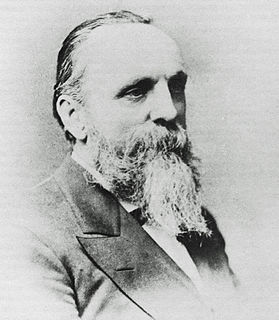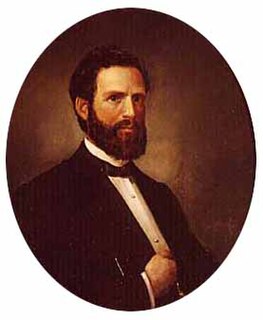Related Research Articles

The 1868 and 1869 United States House of Representatives elections coincided with the 1868 United States presidential election, which was won by Ulysses S. Grant.

The 1868 New York state election was held on November 3, 1868, to elect the governor, the lieutenant governor, a Canal Commissioner, an Inspector of State Prisons and the Clerk of the Court of Appeals, as well as all members of the New York State Assembly.

The 1869 United States Senate election in New York was held on January 19, 1869, by the New York State Legislature. Incumbent Senator Edwin D. Morgan stood for a second term in office, but lost the support of the Republican legislative caucus in favor of Reuben Fenton.
Members of the New South Wales Legislative Assembly who served in the sixth parliament of New South Wales held their seats from 1869 to 1872.</ref> The 1869–70 election was held between 3 December 1869 and 10 January 1870 with parliament first meeting on 27 January 1870. There were 72 members elected for 52 single member electorates, 6 two member electorates and 2 four member electorates. Due to a change in the Constitution of New South Wales the maximum term of this parliament was reduced from 5 years to 3. However the assembly was dissolved after only 25 months after the third government of Sir James Martin lost a vote of supply. The Speaker was William Arnold.
The 1868 and 1869 United States Senate elections were elections which had the Republican Party maintain their majority in the United States Senate. However, six former Confederate states were also readmitted separately from the regular election, each electing two Republicans. This increased the Republicans' already overwhelming majority to the largest proportion of seats ever controlled by the party.
The 1869 United States Senate election in Massachusetts was held on January 19, 1869. Incumbent Charles Sumner was re-elected to a fourth term in office.

The 1869 United States Senate election in Pennsylvania was held on January 19, 1869. John Scott was elected by the Pennsylvania General Assembly to the United States Senate.
The 1869–70 New South Wales colonial election was held between 3 December 1869 and 10 January 1870. This election was for all of the 72 seats in the New South Wales Legislative Assembly and it was conducted in 52 single-member constituencies, six 2-member constituencies and two 4-member constituencies, all with a first past the post system. Suffrage was limited to adult white males. The previous parliament of New South Wales was dissolved on 15 November 1869 by the Governor, Lord Belmore, on the advice of the Premier, John Robertson.
The 1864–65 New South Wales colonial election was held between 22 November 1864 and 10 January 1865. This election was for all of the 72 seats in the New South Wales Legislative Assembly and it was conducted in 52 single-member constituencies, six 2-member constituencies and two 4-member constituencies, all with a first past the post system. The previous parliament of New South Wales was dissolved on 10 November 1864 by the Governor, Sir John Young, on the advice of the Premier, James Martin. Suffrage was limited to adult white males.

Virginia's elections of 1869 occurred during the post-American Civil War Reconstruction Era and included African-American candidates and so-called "carpetbaggers", politicians from the North, often former Union Army officers, who ran in elections in southern states then under the authority of the Federal government and U.S. Army. The election included the 1869 Virginia gubernatorial election held on July 6, 1869 to elect the governor of Virginia. Gilbert Carlton Walker was elected as a "True Republican" defeating H. H. Wells, who was running as a "Radical Republican." Walker switched his party affiliation to Democratic in 1870.

The 1869 Minnesota gubernatorial election was held on November 2, 1869 to elect the governor of Minnesota.
Elections to Liverpool Town Council were held on Monday 1 November 1869. One third of the council seats were up for election, the term of office of each councillor being three years.
The 1869 Newton by-election was a by-election held on 19 March 1869 during the 4th New Zealand Parliament in the Auckland electorate of Newton.
The 1869 Town of New Plymouth by-election was a by-election held on 28 April 1869 in the Town of New Plymouth electorate during the 4th New Zealand Parliament.
The 1869 City of Dunedin by-election was a by-election held on 5 March 1869 in the City of Dunedin electorate in Dunedin during the 4th New Zealand Parliament.
The 1869 Taieri by-election was a by-election held on 19 June 1869 during the 4th New Zealand Parliament in the Otago electorate of Taieri.

The 1869 Connecticut gubernatorial election was held on April 5, 1869. It was a rematch of the 1868 Connecticut gubernatorial election. Republican nominee Marshall Jewell defeated incumbent governor and Democratic nominee James E. English with 50.22% of the vote.

The 1869 Iowa gubernatorial election was held on October 12, 1869. Incumbent Republican Samuel Merrill defeated Democratic nominee George Gillespie with 62.93% of the vote.

In the 1869 Iowa State Senate elections, Iowa voters elected state senators to serve in the thirteenth Iowa General Assembly. Following the expansion of the Iowa Senate from 49 to 50 seats in 1869, elections were held for 21 of the state senate's 50 seats. State senators serve four-year terms in the Iowa State Senate.
The 1869 Mississippi gubernatorial election was held on November 30, 1869 in order to elect the Governor of Mississippi. James L. Alcorn, Republican and moderate planter who had previously served in the Confederate Army, defeated National Union Republican Party nominee Judge Lewis Dent, the brother-in-law of President Ulysses S. Grant and former Union Army official. The Democratic Party supported Dent rather than nominating their own candidate. It was the first election following the Reconstruction era military governorship of Adelbert Ames.
References
- ↑ Craig, F. W. S. (1977). British parliamentary election results 1832–1885 (1 ed.). London: Macmillan. p. 563.